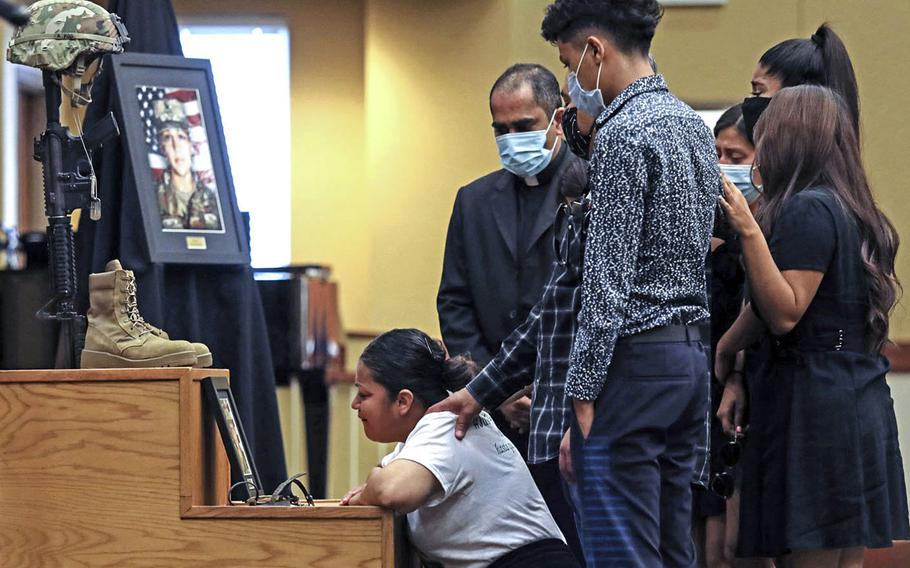A memorial to honor Spc. Vanessa Guillen remains one year later in the parking lot of a tattoo shop in Killeen, Texas. Guillen, 20, was killed April 22, 2020, by a fellow soldier at Fort Hood. Her death has led to numerous investigations that have spurred reforms within the Army. (Rose L. Thayer/Stars and Stripes)
AUSTIN, Texas — More than a dozen additional disciplinary actions and firings were announced Friday as new information was released about the response to the disappearance and death of Spc. Vanessa Guillen at Fort Hood.
Gen. Michael X. Garrett, commander of U.S. Army Forces Command, announced 13 officers and noncommissioned officers will be disciplined as a result of an internal Army investigation report.
“I directed this investigation to identify what happened and to find areas where we needed to improve across our command,” Garrett said in a statement. “We can and must hold ourselves accountable, learn and improve across all our Army units. To do any less breaks trust with our people and the American public.”
Guillen, a small arms repairer in the 3rd Cavalry Regiment, disappeared during the workday on April 22, 2020. After more than two months, investigators found her body buried along a river miles from the central Texas Army base. Spc. Aaron Robinson, a fellow soldier in the regiment, is believed to have killed her with a hammer in an arms room that he supervised. When confronted by local law enforcement July 1 in nearby Killeen, Robinson shot himself dead.
The 264-page report released Friday contains the findings of an internal administrative investigation, commonly known as a 15-6, directed by Army Forces Command.
The investigation, announced in September and under the direction of Gen. John Murray, the commander of Army Futures Command, looked into every echelon of Guillen’s leadership between April 22 and July 1 to learn what her leaders knew and when.
In December, following the release of an outside investigation into Fort Hood, the Army fired or suspended 14 leaders, including some personnel in Army Criminal Investigation Command. Those suspensions included every leader responsible for Guillen from the squad to battalion level. They were not named by the Army.

The family of Spc. Vanessa Guillen grieves in front of her Soldier’s Cross during her unit memorial ceremony at Fort Hood, Texas, on July 17. Several hundred people — family, friends and fellow soldiers — attended the ceremony in the post’s Spirit of Fort Hood Chapel. (Blair Dupre/U.S. Army)
Six of the soldiers disciplined Friday were part of the initial round of actions in December, bringing the number reprimanded in relation to Guillen’s death to 21.
Three leaders from the brigade to corps level were fired in December. Maj. Gen. Scott Efflandt, then the deputy commander of III Corps, who was the acting base commander at the time of Guillen’s disappearance and death, Col. Ralph Overland, and Command Sgt. Maj. Bradley Knapp, the commander and top enlisted soldier of Guillen’s unit, the 3rd Cavalry Regiment, were fired.
Garrett on Friday fired five soldiers from leadership positions who are current or former leaders within the 3rd Cavalry Regiment. Of the five, three will also receive General Officer Memorandums of Reprimand, a written reprimand that goes into a soldier’s permanent file.
Garrett also referred further action against seven additional officers and NCOs to Lt. Gen. Pat White, commander of III Corps and Fort Hood, and further action against one NCO to a separate command. One of those eight leaders will be fired and all will receive reprimand letters. Many of these actions allow for the soldier to respond and include a review period, said Army officials said Friday.
Army policy prohibits the release of the names of the battalion level and below commanders and leaders who received reprimand.
One of the leaders included in Friday’s round of discipline included a senior NCO that the investigation found to have sexually harassed Guillen on two occasions. However, the Army would not say exactly what that discipline included.
“This supervisor created an intimidating, hostile environment. The unit leadership was informed of the harassment as well as the supervisor’s counterproductive leadership, and failed to take appropriate action,” according to the report’s executive summary.
Disciplinary action in December was based on the findings of the Fort Hood Independent Review Committee, which found the base to have an environment “permissive” of sexual assault and harassment and a lack of trust in the program to prevent and respond to those corrosive behaviors. The committee also found the base’s criminal investigation office was a training ground for new recruits and often failed to conduct timely, professional investigations.
Ryan McCarthy, who was the Army secretary at the time, announced the independent committee in July and the Army and Fort Hood continue to work on implementing all 70 recommendations that it provided. The service also is working to completely overhaul and restructure its Criminal Investigation Command, known as CID, and its Sexual Harassment/Assault Response and Prevention Program, known as SHARP. The Army has already implemented new policies and procedures for missing soldiers.
When the Army fires a soldier or leader, those personnel remain in the service, but are removed from the position they currently hold. Army officials said Friday that they could not speculate whether any of the letters of reprimand issued could be career-ending.
Efflandt was announced in February as a special assistance to the commander of U.S. Army North at Joint Base San Antonio, Texas. Knapp has since joined the 3rd Battalion, 358th Field Artillery Regiment at Joint Base Lewis-McChord, Wash., as its senior enlisted adviser. Information on Overland was not immediately available Friday.
Maj. Gen. Jeff Broadwater and Command Sgt. Maj. Thomas Kenny of the 1st Cavalry Division, which was not part of Guillen’s chain of command, were suspended, pending the results of an investigation ignited by the December report into the unit’s command climate and implementation of a sexual assault prevention program. That investigation is still ongoing.